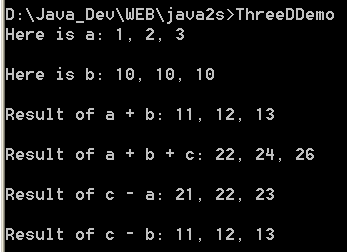An example of operator overloading

/*
C#: The Complete Reference
by Herbert Schildt
Publisher: Osborne/McGraw-Hill (March 8, 2002)
ISBN: 0072134852
*/
// An example of operator overloading.
using System;
// A three-dimensional coordinate class.
class ThreeD {
int x, y, z; // 3-D coordinates
public ThreeD() { x = y = z = 0; }
public ThreeD(int i, int j, int k) { x = i; y = j; z = k; }
// Overload binary +.
public static ThreeD operator +(ThreeD op1, ThreeD op2)
{
ThreeD result = new ThreeD();
/* This adds together the coordinates of the two points
and returns the result. */
result.x = op1.x + op2.x; // These are integer additions
result.y = op1.y + op2.y; // and the + retains its original
result.z = op1.z + op2.z; // meaning relative to them.
return result;
}
// Overload binary -.
public static ThreeD operator -(ThreeD op1, ThreeD op2)
{
ThreeD result = new ThreeD();
/* Notice the order of the operands. op1 is the left
operand and op2 is the right. */
result.x = op1.x - op2.x; // these are integer subtractions
result.y = op1.y - op2.y;
result.z = op1.z - op2.z;
return result;
}
// Show X, Y, Z coordinates.
public void show()
{
Console.WriteLine(x + ", " + y + ", " + z);
}
}
public class ThreeDDemo {
public static void Main() {
ThreeD a = new ThreeD(1, 2, 3);
ThreeD b = new ThreeD(10, 10, 10);
ThreeD c = new ThreeD();
Console.Write("Here is a: ");
a.show();
Console.WriteLine();
Console.Write("Here is b: ");
b.show();
Console.WriteLine();
c = a + b; // add a and b together
Console.Write("Result of a + b: ");
c.show();
Console.WriteLine();
c = a + b + c; // add a, b and c together
Console.Write("Result of a + b + c: ");
c.show();
Console.WriteLine();
c = c - a; // subtract a
Console.Write("Result of c - a: ");
c.show();
Console.WriteLine();
c = c - b; // subtract b
Console.Write("Result of c - b: ");
c.show();
Console.WriteLine();
}
}
Related examples in the same category